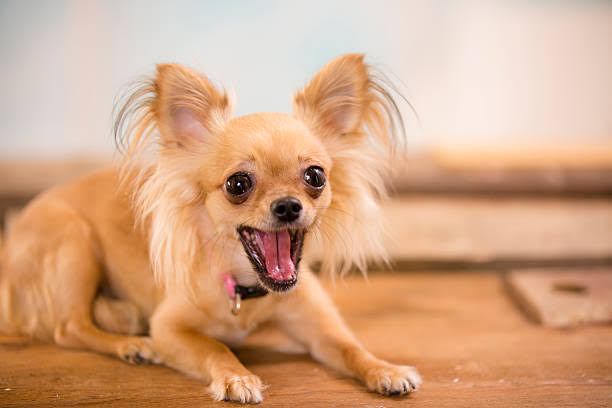Chihuahua Teeth

Chihuahua Teeth:- Chihuahuas are a beloved breed known for their tiny size and big personalities. However, their small stature comes with certain challenges, one of the most significant being their susceptibility to dental issues.
Chihuahua owners often report dental problems like tooth crowding, plaque buildup, and gum disease, all of which can lead to severe health complications if left untreated. But what makes Chihuahuas more prone to dental problems than other breeds? This article delves into the factors behind the breed’s dental challenges and provides solutions for maintaining their oral health.

The Root Cause: Small Head, Big Teeth
One of the primary reasons Chihuahuas face dental issues is their disproportionately small heads compared to the number of teeth they have. Like all dogs, Chihuahuas have 42 adult teeth—20 on the top jaw and 22 on the bottom. These teeth include 12 incisors, 4 canines, 16 premolars, and 10 molars, just like in larger breeds. However, fitting all these teeth into their tiny mouths leads to overcrowding.
This tooth crowding can make it difficult for owners to clean their Chihuahua’s teeth properly, which results in the accumulation of plaque—a sticky film of bacteria that forms on teeth. Over time, if plaque is not removed through brushing or other means, it hardens into tartar, which can cause pain, infections, and other dental complications.
The Risks of Dental Problems in Chihuahuas
The consequences of untreated dental issues can range from mild discomfort to life-threatening conditions. Plaque and tartar buildup can lead to gingivitis, an inflammation of the gums often associated with bad breath. While bad breath may seem like a minor annoyance, it can be an early warning sign of more significant dental health problems.
Over time, the bacteria responsible for plaque and gingivitis can seep into the dog’s bloodstream, affecting their bones, tissues, and even major organs. Untreated dental infections have been linked to damage in the kidneys, liver, joints, and heart. Dental issues can also lead to a shorter lifespan and a reduced quality of life for Chihuahuas, as they experience chronic pain and discomfort that affects their overall health and behavior.

Common Dental Problems in Chihuahuas
Chihuahuas are prone to several specific dental issues, including retained puppy teeth, impacted teeth, missing teeth, and malocclusions. Each of these conditions contributes to their overall susceptibility to dental disease.
Retained Puppy Teeth
One common problem is the retention of puppy teeth. Typically, puppies begin to lose their baby teeth around 14 weeks of age, making way for their permanent adult teeth. However, in Chihuahuas and other small breeds, baby teeth sometimes do not fall out as they should. This leads to overcrowding, where both baby and adult teeth are trying to fit into the same space.
Without proper treatment, such as extraction by a veterinarian, retained puppy teeth can contribute to poor oral health. They can interfere with the normal development of adult teeth, leading to further complications such as misalignment and difficulty chewing.
Impacted Teeth
Another issue Chihuahuas may face is impacted teeth, which occur when adult teeth fail to erupt through the gum line. These unerupted teeth can become buried in the jaw, where they may form cysts. As these cysts grow, they can compromise or destroy parts of the jawbone, leading to pain and swelling. Early detection and extraction are essential in preventing severe damage to the jaw and surrounding tissues.
Missing Teeth
In some cases, Chihuahuas may have missing adult teeth. This usually doesn’t cause significant problems, but it’s important to ensure that the tooth is genuinely absent rather than impacted. Regular veterinary check-ups can help identify whether a missing tooth is causing any underlying issues.
Malocclusions
Malocclusion refers to the misalignment of the teeth, where the upper and lower jaws don’t meet properly when the mouth is closed. Chihuahua Teeth can suffer from a variety of malocclusions, with underbites being particularly common. While some owners may find their dog’s underbite endearing, this condition can lead to significant problems.
When the teeth don’t align correctly, they may rub against soft tissues in the mouth or crash against each other. This abnormal contact can lead to attrition (wearing down) of the teeth, damage to the gums, and even death of the pulp, the living part of the tooth. In severe cases, this can result in tooth loss and infection.
Recognizing Signs of Periodontal Disease in Chihuahuas
Periodontal disease is a serious concern for Chihuahua Teeth, as it affects not only their teeth but also the supporting structures around the teeth, including the gums and jawbone. Recognizing the early signs of periodontal disease can help pet owners take action before the condition worsens.
Some of the early warning signs include:
– Bad breath (halitosis)
– Red or swollen gums
– Yellow or brown buildup on teeth (plaque and tartar)
– Loose or missing teeth
– Difficulty chewing or loss of appetite
– Weight loss or changes in eating habits

In more advanced cases, symptoms may include bleeding gums, pus around the teeth, nasal discharge, and swelling in the jaw. If your Chihuahua exhibits any of these symptoms, it’s essential to seek veterinary care as soon as possible.
Preventing Dental Problems in Chihuahuas
The good news is that many of these dental problems can be prevented with proper care and regular maintenance. Here are some tips to keep your Chihuahua’s teeth and gums healthy:
1. Regular Brushing
Brushing your Chihuahua Teeth is one of the most effective ways to prevent plaque and tartar buildup. Use a soft-bristled toothbrush designed for dogs, along with dog-friendly toothpaste (human toothpaste can be toxic to pets). Daily brushing is ideal, but brushing at least a few times a week can significantly reduce the risk of dental issues.
2. Dental Chews and Toys
Dental chews and toys are designed to help clean your Chihuahua’s teeth as they chew. These products can remove food particles and plaque while providing entertainment. Make sure the chews and toys are appropriate for your dog’s size to avoid choking hazards.
3. Diet Considerations
Diet plays a crucial role in maintaining dental health. Dry kibble can help scrape plaque off teeth, while sugary treats should be avoided. Dental-friendly treats are also available to promote oral hygiene.
4. Regular Vet Check-Ups
Routine veterinary check-ups are essential for detecting dental problems early. Your vet can perform professional cleanings and identify any potential issues before they become serious. Regular check-ups also provide an opportunity for your vet to monitor the condition of your Chihuahua Teeth and gums, ensuring they stay healthy throughout their life.
Conclusion
Chihuahuas may be small in size, but their dental problems can be large if not properly managed. The combination of a small mouth, overcrowded teeth, and a longer lifespan makes them more susceptible to dental issues than other breeds. However, with proper care, regular brushing, and routine veterinary visits, you can ensure that your Chihuahua enjoys a happy, healthy life free from painful dental problems. By staying vigilant and proactive about their oral health, you’ll be giving your Chihuahua the best chance for a long, comfortable life.
Also Read:-




